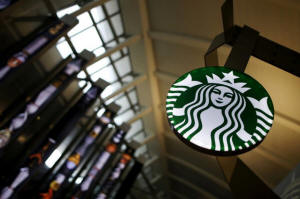|
Civil rights advisers hope Starbucks'
anti-bias training sets example
 Send a link to a friend
Send a link to a friend
 [May 29, 2018]
By Lisa Baertlein [May 29, 2018]
By Lisa Baertlein
LOS ANGELES (Reuters) - Black leaders who
are advising Starbucks Corp <SBUX.O> on its anti-bias training program,
which begins Tuesday, hope it will reinvigorate decades-old efforts to
ensure minorities get equal treatment in restaurants and stores, setting
an example for other corporations.
Starbucks committed to the training after a Philadelphia cafe manager's
call to police resulted in the arrests of two black men who were waiting
for a friend. The arrests sparked protests and accusations of racial
profiling at the coffee chain known for its liberal stances on social
issues such as same-sex marriage.
Anti-bias training is intended to get participants to recognize their
own unconscious biases and avoid unintentional discrimination.
Starbucks is closing 8,000 company-owned U.S. stores at around 2 pm
local time on Tuesday as a first step in training 175,000 employees on
racial tolerance. Some 6,000 licensed Starbucks cafes will remain open
in locations such as grocery stores and airports, and those employees
will be trained at a later time.
Starbucks' training could have a lasting impact on its employees'
behavior and pave the way for other companies to finally tackle racism
in their own eateries and shops, said Heather McGhee, president of
public policy group Demos.

McGhee said one of her earliest memories as a black girl was being
chased from a penny candy store by a white store manager.
McGhee and NAACP Legal Defense and Educational Fund President Sherrilyn
Ifill, who are both advising Starbucks on its program, said they have
been in regular contact with company executives, particularly Chief
Operating Officer Rosalind Brewer, who also is African-American.
"People forget that the effort to be treated as full citizens with
dignity in public spaces in this country was central to the civil rights
movement, from the Freedom Riders to the Montgomery bus boycott to the
lunch counter sit ins" of the 1950s and 1960s, said Ifill.
[to top of second column]
|

A Starbucks store is seen inside the Tom Bradley terminal at LAX
airport in Los Angeles, California, U.S. on October 27, 2015.
REUTERS/Lucy Nicholson/File Photo

The NAACP in the past sued Abercrombie & Fitch <ANF.N>, Wet Seal and
Denny's Corp <DENN.O> for racial bias. Each of the companies reached
multi-million dollar settlements and vowed to change their
practices.
on with a co-worker and to dial 911 if the situation becomes unsafe.
Starbucks did not comment on future training plans. It has said it
intends to eventually share its training program with other
companies.
Corporate America began to embrace anti-bias training after the 2014
killing of Michael Brown, an unarmed black teenager by a white
police officer in Ferguson, Missouri.
Most anti-bias programs involve education on what unconscious bias
is, why humans have it, its impact on social interactions and
society and mitigation tools.
"Most people want to think of themselves as being fair ... if you
give them the tools to do that, their better angels take over," said
Howard Ross, author of "Everyday Bias" and founding partner of Cook
Ross, which offers training on unconscious bias and gave Starbucks
input on its program.
(Reporting by Lisa Baertlein in Los Angeles; Editing by Peter
Henderson and Cynthia Osterman)
[© 2018 Thomson Reuters. All rights
reserved.]
Copyright 2018 Reuters. All rights reserved. This material may not be published,
broadcast, rewritten or redistributed.
Thompson Reuters is solely responsible for this content.
 |